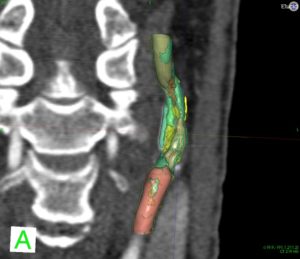
Proximo Medical has announced a partnership with Elucid Bioimaging, a developer of diagnostic image analysis software used to assist in the detection and treatment of myocardial infarction and stroke. A press release states that Elucid Bioimaging’s signature technology, vascuCAP, is the only Food and Drug Administration (FDA)-cleared, histologically-validated software for evaluation of atherosclerotic plaque stability from a single computed tomography (CT) angiography to inform the risk of a cardiovascular event and treatment selection.
Blake Richards, CEO, Elucid Bioimaging, comments: “VascuCAP uses machine learning to analyse CT scans of arteries and automatically quantify and classify the type of atherosclerotic plaque. This information, along with key measures of the artery’s structure, leads to significant improvements in accurately predicting events, informing optimal intervention, and, when appropriate, pre-procedure planning. VascuCAP helps cardiologists, vascular surgeons, and radiologists determine the right intervention for the right patient to a level of specificity that existing non-invasive diagnostics cannot detect. Partnering with Proximo Medical allows us to de-risk our commercial execution strategy with proven marketing and sales expertise, enhancing commercial viability and rapidly driving awareness among key opinion leaders.”
Proximo Medical is a business acceleration solution that aims to overcome medical device commercialisation challenges by providing innovators with market analysis, economic insights, access to key thought leaders and a world class sales and marketing team focused on commercial execution that will maximise capital impact.
Brett Martin, CEO, Proximo Medical, states: “Health information technology and diagnostics are the future of healthcare. We are pleased to be partnering with Elucid Bioimaging, a company that is helping physicians address the world’s two leading causes of death, heart attack and stroke, by using intelligence to analyse scans with real time data, providing physicians and patients more information to help predict adverse cardiovascular events and appropriate treatment pathways.”










